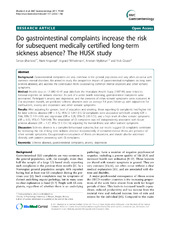| dc.contributor.author | Øverland, Simon Nygaard | |
| dc.contributor.author | Knapstad, Marit | |
| dc.contributor.author | Wilhelmsen, Ingvard | |
| dc.contributor.author | Mykletun, Arnstein | |
| dc.contributor.author | Glozier, Nicholas | |
| dc.date.accessioned | 2012-01-24T10:54:02Z | |
| dc.date.available | 2012-01-24T10:54:02Z | |
| dc.date.issued | 2011-07-29 | eng |
| dc.Published | BMC Gastroenterology 2011, 11:88 | en |
| dc.identifier.issn | 1471-230X | |
| dc.identifier.uri | https://hdl.handle.net/1956/5517 | |
| dc.description.abstract | Background: Gastrointestinal complaints are very common in the general population and very often co-occur with common mental disorders. We aimed to study the prospective impact of gastrointestinal complaints on long term sickness absence, and address the contribution from co-occurring common mental disorders and other somatic symptoms. Method: Health data on 13 880 40-45 year olds from the Hordaland Health Study (1997-99) were linked to national registries on sickness absence. As part of a wider health screening, gastrointestinal complaints were ascertained. Participant’s anxiety and depression, and the presence of other somatic symptoms were evaluated. In Cox regression models, we predicted sickness absences over an average 5.4 years follow-up, with adjustment for confounders, anxiety and depression and other somatic symptoms. Results: After adjusting for gender, level of education and smoking, those reporting GI complaints had higher risk for later sickness absence (HR = 1.42, 95% CI 1.34-1.51). GI complaints were associated with both anxiety (OR = 3.66, 95% CI 3.31-4.04) and depression (OR = 3.28, 95% CI 2.89-3.72), and a high level of other somatic symptoms (OR = 8.50, 95% CI 7.69-9.40). The association of GI complaints was still independently associated with future sickness absence (HR = 1.17, 95% CI 1.10-1.16) adjusting for mental illness and other somatic symptoms. Discussion: Sickness absence is a complex behavioural outcome, but our results suggest GI complaints contribute by increasing the risk of long term sickness absence independently of comorbid mental illness and presence of other somatic symptoms. Occupational consequences of illness are important, and should also be addressed clinically with patients presenting with GI complaints. | en_US |
| dc.language.iso | eng | eng |
| dc.publisher | BioMed Central | eng |
| dc.rights | Attribution CC BY | eng |
| dc.rights.uri | http://creativecommons.org/licenses/by/2.0/ | eng |
| dc.subject | Gastrointestinal complaints | eng |
| dc.subject | Anxiety | eng |
| dc.subject | Depression | eng |
| dc.subject | Sickness absence | eng |
| dc.title | Do gastrointestinal complaints increase the risk for subsequent medically certified long-term sickness absence? The HUSK study | eng |
| dc.type | Peer reviewed | |
| dc.type | Journal article | |
| dc.description.version | publishedVersion | |
| dc.rights.holder | Copyright 2011 Øverland et al; licensee BioMed Central Ltd. | |
| dc.identifier.doi | https://doi.org/10.1186/1471-230x-11-88 | |
| dc.identifier.cristin | 850480 | |
| dc.subject.nsi | VDP::Social science: 200::Psychology: 260 | eng |
| dc.subject.nsi | VDP::Medical disciplines: 700::Health sciences: 800::Community medicine, Social medicine: 801 | eng |

